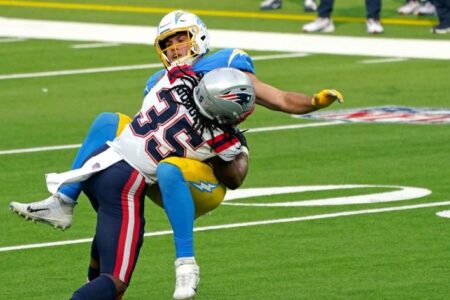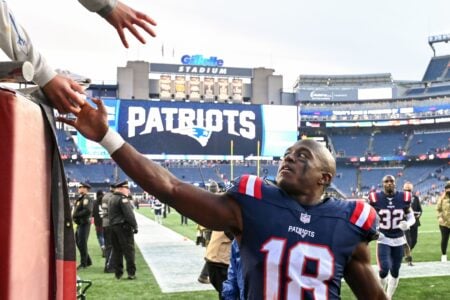Patspsycho
Veteran Starter w/Big Long Term Deal
- Joined
- Aug 13, 2009
- Messages
- 9,921
- Reaction score
- 0
Registered Members experience this forum ad and noise-free.
CLICK HERE to Register for a free account and login for a smoother ad-free experience. It's easy, and only takes a few moments.I've always thought of 26-27-60 as a formula made up by somebody with too much off-season time on his hands.
But, I have it from more reliable sources that, if you click your heels together three times while repeating "There's no place like Canton" each time, you magically are transported to the sixth round where Auntie Em tells you to draft the first QB remaining, in alphabetical order.
He was the first QB alphabeticallyhis combine number was 1!
I've always thought of 26-27-60 as a formula made up by somebody with too much off-season time on his hands.
But, I have it from more reliable sources that, if you click your heels together three times while repeating "There's no place like Canton" each time, you magically are transported to the sixth round where Auntie Em tells you to draft the first QB remaining, in alphabetical order.
So, smarter, more successful and more experienced has an edge? Who would have guessed?
Leaves out the two most successful QBs of the era too.
Brady actually has all those three attributes- just didn't have the requisite number of starts (only 25 in college).
That'd be true except if you take a look at the list of QB's who qualify and those who don't. I'd say that it has more hits than misses.
It'd be interesting to see what happens with Cam Newton who only has 1 out of those 3 attributes.
I've always thought of 26-27-60 as a formula made up by somebody with too much off-season time on his hands.
But, I have it from more reliable sources that, if you click your heels together three times while repeating "There's no place like Canton" each time, you magically are transported to the sixth round where Auntie Em tells you to draft the first QB remaining, in alphabetical order.
The 26-27 are probably good starting points but I find the 60% completion percentage interesting. Can you really measure a QB's accuracy based on his completion percentage? There are so many variables i kind of think that's bull****.There's so much more to completing passes than just accuracy.
If you define "hits" broadly, then you are right, as is the case in the 11 names cited (the Brees to Stafford list). Those guys are all capable of starting for an NFL team, but only three of the eleven have produced a championship, one time each, and they have only appeared in four SB's combined.
Brady, Favre, McNabb and Roethlisberger, who fail the test, have appeared in 10 SB's and won six.
If you look at the test, it says that a guy started for all of two seasons or all/much of three college seasons (typical college schedule is 12 games, but some play 13 or 14 with conference and BCS post season games). It says that he completed a lot of passes (60% when the average for an SB era HOF QB is 57.1%). It says that he scored above average on the Wonderlic Test.
(The Rule assumes that the QB played in a competitive conference, where holding the job for two or three years and completing a bunch of passes are meaningful accomplishments.)
The problem with it is that it depends on hindsight. There are too many significant exceptions to the rule to make it a "baseline" indicator in real time and it is too unable to predict who will truly excel to make it a "topline" indicator.
I guess it could give you pause if you're thinking of giving big bucks to a guy who flunked it, but it could also lead you to overlook a Brady or a Favre. So, of what real use is it, other than in hindsight?














